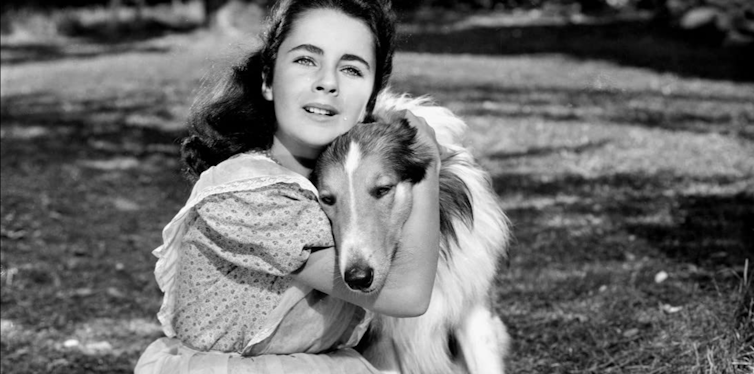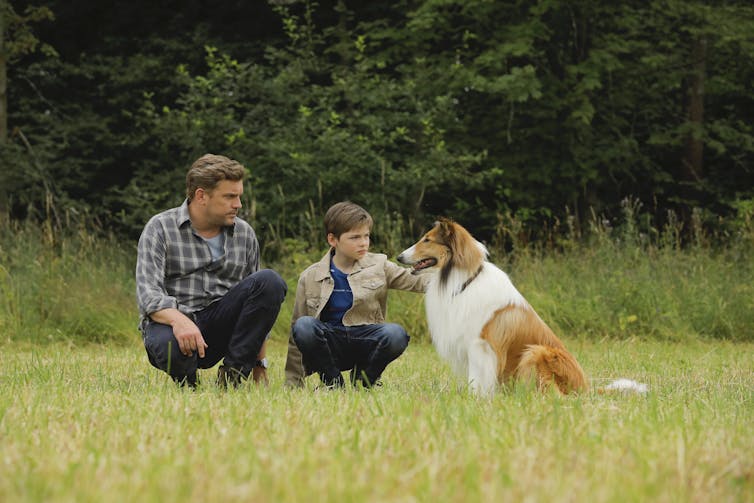Lassie Come Home (again): remake of a classic is a reminder of our bond with pets
- Written by Vanessa Rohlf, La Trobe University
Review: Lassie Come Home, directed by Hanno Olderdissen
This week, Lassie returned to the screens, with a remake of the 1943 film coming 80 years since Eric Mowbray Knight’s classic novel was first published.
In this retelling of the story, Lassie and a young boy named Florian are inseparable. But Lassie is temporarily rehomed, after Florian’s father loses his job and the family is forced to move to an apartment where pets are not allowed. Lassie has other ideas. She escapes to begin an epic journey back to the boy she loves. At the same time, Florian sets out to find her.
At the end of a tough year, the modern remake of Lassie Come Home, reminds us of our simple, healing, and mutually beneficial bond with dogs.
‘Lassie!’ ‘Woof woof!’A long lead
What is it about the bond between a boy and his dog Lassie that has stood the test of time? Recent statistics show that 40% of Australian households own at least one dog. Global dog ownership rates are as high as 66% in Argentina. American households and those in the UK are less keen with rates of 50% and 27% respectively.
We and our canine companions share a long history. Dogs were the first domesticated species. While, we don’t know for sure how far back our relationship goes, current evidence suggests it dates back to at least 12,000 years.
 Young Elizabeth Taylor appeared in the original Lassie Come Home (1943) as did dog ‘Pal’ and Roddy McDowall.
IMDB
Young Elizabeth Taylor appeared in the original Lassie Come Home (1943) as did dog ‘Pal’ and Roddy McDowall.
IMDB
The story of Lassie doesn’t go back quite that far. After the initial hit Lassie movie there were six more films before the Collie dog became a star of the small screen. The TV series was produced from 1954–1974 and featured numerous dogs (all males playing the female Lassie).
This is a modern German retelling of the original movie but don’t expect it to be the same as the series. The story focuses more on the challenges both Florian and Lassie face before finally reuniting rather than the interactions between them. It is an equally enjoyable watch for adults and kids.
Read more: Your dog's nose knows no bounds – and neither does its love for you
Pandemic pups
Florian and his dog Lassie are willing to travel great distances to be reunited. The love we humans have for our dogs is real. Thousands of years of co-evolution, has meant that even a dog’s gaze can increase our oxytocin levels, a hormone associated with bonding.
 Dogs really are the best people.
Warner Bros
Dogs really are the best people.
Warner Bros
Interacting with a dog can decrease blood pressure, and increase both oxytocin and other feel good hormones like dopamine. Further, during times of emotional distress, children turn to dogs, sometimes over humans, as a source of support and comfort.
The original Lassie Come Home was set in tough times when the Depression forces a family to sell their beloved pet.
During this year’s COVID-19 pandemic, we’ve seen a significant increase in dog ownership. Perhaps, getting a dog during the pandemic provides us with comfort during these uncertain times. Dog ownership may also help promote physical activity, and the human animal bond may protect against psychological distress and reduce feelings of isolation.
Read more: Man's stressed friend: how your mental health can affect your dog
It goes both ways
Just as Florian longs for his dog. Lassie longs for him too. She is by no means a lone wolf.
This long history of co-evolution means that our dogs may actually love us back. Remember how our oxytocin level increases when we gaze at our dogs? Our dog’s levels also increase. Spoiler alert: Lassie’s oxytocin levels would most definitely have increased upon her reunion with Florian and, as a viewer, yours might very well too.
There seems to be something special about dogs, in particular. Even hand-raised wolves rarely gaze at their owners and do not show a preference for human companionship in the way that dogs do. Dog’s may attach to humans in a similar way children attach to their caregivers.
Dogs will often search for their owner when they leave and will greet them more enthusiastically upon their return compared to a stranger. Wolves, in contrast, may only demonstrate some of these behaviours if they are intensely socialised.
In the Lassie series, this difference was highlighted by the recurring role of “Blaze: the untrappable wolf dog”, with one episode called Lassie and the Savage.
Not only do dogs love us, but they also can understand us. Dogs demonstrate the ability to follow human pointing and can even pick up on our emotional cues. The dogs who played the original Lassie reportedly knew hundreds of commands.
‘Gee mum, I want to be a naturalist … you get to live outdoors and make friends with all the animals.’Although our dogs demonstrate this ability to read us humans, we have a little more to learn when it comes to reading our canine companions. Dog bites result in hundreds of hospital admission and emergency department presentations, with children particularly at risk.
The bond between humans, especially children and their dogs, is truly beautiful and the new Lassie film captures this well. But, be mindful to supervise children and learn the cues that tell us when our very own Lassies aren’t enjoying interactions as much as we are.
If you want to be reminded of the special bond between humans and dogs, watch Lassie Come Home, then give your own dog (or someone else’s) a pat. With permission, of course.
Read more: Why can't dogs eat chocolate?
Lassie Come Home is now in cinemas.
Authors: Vanessa Rohlf, La Trobe University





